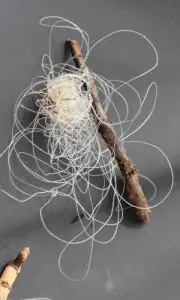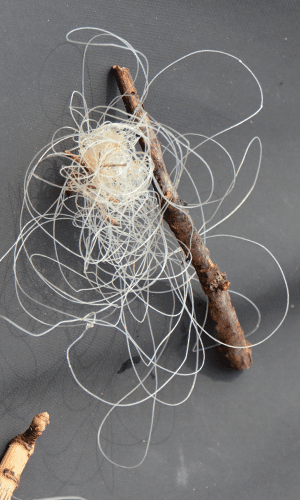
Can fishing line be recycled? If you spend a lot of time in the Great Outdoors then you quickly come to appreciate not only the beauty of nature but also the need to make sure it isn’t spoiled. We don’t have to tell you that hunters understand conservation, anglers understand the importance of healthy limits, just as timber men understand the need for reforestation.
They go hand in hand with being a responsible outdoorsman!
My brother and I grew up in a small town Iowa Boy Scout Troop that was run by some truly old school Scout Leaders. In other words, you didn’t just clean up the campsite before you left for the weekend, but they expected it to be cleaner than how we found it. The ultimate “Leave No Trace” philosophy before that became a widespread thing.
Only two types of fishing line can currently be recycled. Both monofilament fishing line and fluorocarbon fishing line can be recycled but other types of fishing line can’t. Recycling is done through collection programs while other types of fishing line should be disposed of carefully.
There are plenty of pictures out there with animals snagged up in trash, disposed fishing nets, or fishing line. This isn’t stuff you want in large amounts of trash in the environment.
Anyone who does a lot of fishing knows when it’s time to change out the line, but then what happens to the throw away line? This is where proper disposal and/or recycling is so important.
Table of Contents
So Can Fishing Line Be Recycled or Not?
Short answer: generally yes. As stated earlier monofilament (which is by far and away the most commonly bought & used fishing line) and fluorocarbon lines can be recycled as well however other kinds can not.
Why would you need to recycle fishing line? Well anyone who has done any amount of fishing knows that it’s very common for the fishing line to break or just fray and wear out over time. You may have a substantial amount of this material left over, perhaps still wrapped around old spools, but you know it’s time to upgrade.
Throwing the line away is not the way to go. and they may be wondering how they can recycle this material. Most people have thrown this in the trash for years, but a new impetus on recycling everything has become prominent in our modern society, for good reason.
Besides – the only fish we want wrapped up in fishing line are the ones we reel in!
Can All Types of Fishing Line Be Recycled?
The short answer to this question is no. It must be a very specific type of fishing line before it would be eligible for the recycling process. In particular, single filament fishing line, specifically a nylon based product, can be recycled if it is a fluorocarbon or monofilament based material.
On the other hand, if you are using a braided fishing line, this is not applicable for the recycling process. Part of the reason is the amount of plant material, or potential growth from organisms, that could be caught up in the braids of the line which will make it an recyclable. If this latter version of fishing line is what you have, jump down to the section on proper disposal to learn more.
If you do have a substantial amount of single filament fishing line, you may wonder how it is recycled. We have the answer coming up right here!
How Single Filament Fishing Line Is Recycled
You have several options available when it comes to recycling this material. There are companies, such as the Berkeley Pure Fishing company, based in the state of Iowa, that will melt all of it down and use it for secondary purposes. This recycled fishing line can be re-purposed for other products related to fishing which will include the creation of toys, fish habitats, spools for line, and even tackle boxes.
It should be noted that this material may not be re-purposed into new monofilament line, but despite that, it is still a great way to provide recycled material for the other products mentioned.
That doesn’t mean fishing line can be just tossed into the recycling bin. That is definitely not the case!
The recycling is done with a local point of contact setting up deposits around popular fishing areas or public lands where an active fisherman can drop off his or her used fishing line that they want to have recycled. Someone locally will pick them up and take them to the companies who actually do the specific recycling of this fishing line.
There’s more great information on this at this New Mexico Parks Website.
How Is Fluorocarbon Fishing Line Recycled?
Pretty much the same way as monofilament fishing line is recycled. This must be dropped off or mailed to a collection point, it gets picked up by local volunteers working to keep these recycling programs going and make sure that the fishing line gets to the proper place. Contrary to popular belief, it won’t become new fishing line, but the material can be collected, molded, and recycled into other things to prevent it from becoming waste that can harm wildlife.
Can Wire Fishing Line or Braided Fishing Line Be Recycled?
Nope. Unfortunately due to the nature of the design or materials used, these types of fishing line can’t be recycled. They either need to be re-purposed manually or properly disposed of. Don’t just throw an entire reel into the garbage. Even a little bit of fishing line in the environment can cause major issues if not properly disposed of.
You can read more common fishing line recycling questions HERE.
How to Properly Dispose of Non-Recyclable Fishing Line
While it can take a little bit of time, properly disposing of braided, wire, or other non-recyclable fishing line isn’t difficult. While some people recommend simply burning the line, the proper way to dispose of it if throwing it away is to cut all the line into small pieces, less than 12 inches in length each. By cutting these in pieces, they are short and open and therefore aren’t likely to cause problems at that point.
Once every bit is cut into these small pieces then they can be tossed into the trash. Some people recommend 8 inches or less, but 12 inches or less should be fine.
Don’t Place Fishing Line into Your Recycling Bin!
Although this is a common practice that many anglers have, it may not be the best solution. Part of that reason is the fishing line is made of a high density plastic. This particular type of plastic will require a specific type of procedure to melt it down which may not be available at most municipal solid waste treatment centers. Your best option is to simply save as much of this line as you can, and send it to companies that specifically repurpose single filament fishing line. This will ensure that the line will be properly re-purposed and utilized.
Although it may seem quite natural to simply toss old fishing line into the trash, or even a recycling container, this will not guarantee that it will avoid a landfill. That’s why sending single filament fishing line, or fluorocarbon based fishing line, to a specified recycling center is your best option.
By taking the extra time to do this, you can contribute to the recycling process, doing your part to help the environment in the process. A healthier outdoor environment is great for outdoor enthusiasts from all walks of life!
In Conclusion
While it would be nice if there was a way to recycle every type of fishing line, it just isn’t viable at this time. Monofilament and Fluorocarbon fishing line can be recycled but at this point other types can’t. If you’re interested in being part of keeping the waterways clean so fish get caught through sports fishing and not from discarded trash (what a waste).
While hopefully more types of fishing line will be recyclable in the future, for now it’s nice to see these programs expanding. If there’s not one in your area, consider contacting a company like Berkley that encourages these programs and be the volunteer in your area. Anything that makes the fishing world better for us is a good change!

